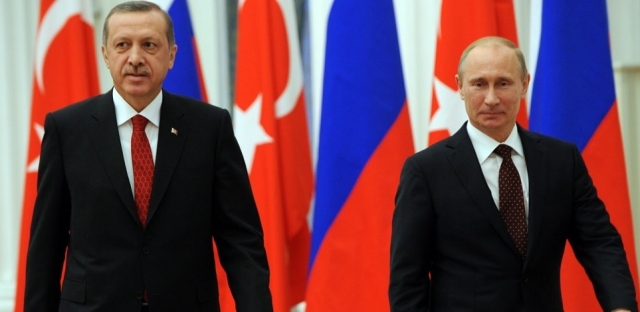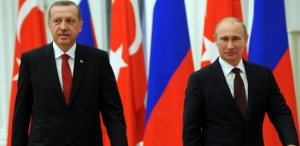Putin and Erdogan Mend Ties as Turkey Pivots to Russia
After months of animosity, Erdogan travelled to Russia’s cultural capital to personally ask Putin’s forgiveness
ST. PETERSBURG – Russian-Turkish relations have been at their lowest ebb since the end of the Cold War ever since a Turkish F-16 shot down a Russian bomber near the Syrian border in November 2015.
In the immediate aftermath of the shoot-down, Russian President Vladimir Putin could barely contain his anger, calling the incident “a personal stab in the back from (Turkish President Recep Tayyip) Erdogan.”
In a matter of days, the once closely aligned authoritarian leaders suddenly found themselves on opposite sides of an international incident that cost the life of a Russian pilot and pitted the two against one another in a bitter war of words over each other’s conduct on the world stage.
The fallout was striking and the response from both Turkey and Russia even more surprising considering the ties the two historic rivals had forged for most of the time Putin and Erdogan had been in power.
Putin’s attempts over the last decade to restore Russia’s dominance over the former Soviet republics and Erdogan’s dreams of creating a brand of neo-Ottomanism in Turkey’s former imperial dominions in the Balkans and Middle East, initially brought the two strongmen together as each shared a mutual disdain for democratic norms, human rights and a visceral hatred of the West.
While historically Russia and Turkey had been bitter rivals in their respective spheres of influence, Putin and Erdogan seemed to set four centuries of animosity aside as the two pursued personal neo-imperialist goals that closely mirrored one another.
Each backed the other as both Putin, and Erdogan consolidated power by increasingly more authoritarian means. Since the mid-2000s, Moscow and Ankara moved ever-closer towards seeing one another as indispensable partners, even budding allies, in the defense of what the Kremlin calls “sovereign democracy” - a one-party dominant system that has been the official model of government in Russia and Turkey for the better part of a decade.
Putin’s United Russia - a conservative, nationalist, irredentist and fervently anti-Western political party – has become the spiritual and practical successor to the old Communist Party of the Soviet Union.
Erdogan’s Islamist Justice and Development Party (AKP) has fundamentally transformed the previously secular Turkish Republic from a staunch NATO ally into a thorn in the side of West, as Erdogan has clashed with his erstwhile allies over ISIS, Israel, refugees and minority rights.
But as their ambitions grew beyond the bonds that initially brought them together, both Putin and Erdogan found themselves on a predictable collision course once events in Ukraine and Syria spun out of control.
Russia and Turkey found themselves on opposite sides in each conflict, Putin and Erdogan’s friendship kept the two countries from coming into direct conflict.
That all changed with the shoot down of a Russian Su-24M attack bomber on November 24.
In response to the downing, Moscow slapped harsh economic sanctions on Turkey and banned its citizens from travelling to the scores of Mediterranean resorts on the Turkish coast.
The travel ban had an immediate effect on the Turkish and Russian economies, as Turkey is the number one tourist destination for Russian citizens and a major source of revenue for Ankara.
The sanctions also had a boomerang affect on Russia, as most agricultural imports from Turkey – Moscow’s largest trading partner for food products – came to an immediate stop and major building and development projects with Turkish companies were halted.
Relations between the two countries went into a deep freeze in the ensuing months, while Putin and Erdogan engaged in a very public duel of personal barbs, with each accusing the other of cratering the mutual understanding they had always enjoyed.
Both leaders demanded that the other apologize for the incident involving the Russian bomber.
But following a failed coup attempt in July by members of the Turkish military who opposed Erdogan’s growing authoritarianism, Islamism and pivot away from decades-old ties to the West, Ankara’s ruptured relations with Russia appear to be on the mend.
Putin was a vocal supporter of Erdogan during the coup and the Turkish security services’ crackdown on civil society and opposition groups in the weeks since the uprising was crushed.
The Kremlin also hailed Erdogan’s order to arrest tens of thousands of journalists, civil servants, military personnel and educators as Turkey’s MiT security service moved swiftly to purge Turkish society of groups who oppose Erdogan and the AKP.
Erdogan’s visit to Putin’s native city of St. Petersburg on Tuesday was a major step towards re-establishing the ties the two previously enjoyed.
Putin vowed to open “a new period of close relations” as they rebuild ties and hailed Erdogan’s handling of the coup and his move towards normalizing relations between Moscow and Ankara.
"Your visit today, despite a very difficult situation regarding domestic politics, indicates that we all want to restart dialogue and restore relations between Russia and Turkey," Putin said when receiving Erdogan.
The dramatic shift in the dynamic between Moscow and Ankara has alarmed many in the West, who worry that Turkey’s pivot towards Russia could cause a fundamental crisis within NATO.
The state-run AKP mouthpiece Anadolu Agency reported that Turkish Foreign Minister Mevlut Cavusoglu claimed in an interview that NATO-member Turkey would establish comprehensive military, intelligence and security ties with Russia.
Cavusoglu went on to say that the West would only have itself to blame if it “lost” Turkey to Russia, and bluntly accused the European Union of backing the failed coup against Erdogan.
“Turkey wanted to cooperate with the West and fellow NATO members up to this point,” Cavusoglu told Anadolu Agency. “But the reaction we got from Western governments didn’t satisfy us, so it’s natural for us to look for other options. But we don’t see this as a move against NATO.”
The Turkish delegation’s visit to Russia on Tuesday was meant not only as a move towards restoring close, friendly ties with Erdogan’s old friend Putin but amounted to a pointed signal to the West.
That message was reinforced by Cavusoglu when he told foreign journalists on Wednesday that confidence in the EU among the Turkish public “had fallen since the July Coup” and said support for the European Union had fallen to “less than 20 per cent” in the last month.
“The West failed a test by supposedly being slow to condemn the bid to overthrow the President (Erdogan) and failed to send a single representative to Ankara since the coup,” Cavusoglu said in his interview with Anadolu Agency.
"Let me say openly and clearly that this is because the EU – the West in general – adopted a favorable position towards the coup plotters and even encouraged the putschists in their goals," said Cavusoglu.
Erdogan reiterated his harsh criticism of the US and EU on Thursday, saying the West is making a grave mistake in their response to the failed coup, and renewed his demand that Washington extradite Erdogan’s archrival, Fethullah Gulen - а self-exiled Muslim cleric - whom he accuses of orchestrating the coup.
Many observers have speculated that Erdogan is attempting to gain diplomatic leverage over the West and mute criticism for his authoritarian domestic policies, while hoping that re-establishing his personal connection with Putin will result in the end of crippling economic sanctions.
For his part, Putin is likely looking at the strategic benefits of pulling Turkey away from its NATO allies as he hopes to triangulate his influence over the Black Sea, Caucasus and Upper Mesopotamian regions.
By guaranteeing Erdogan’s loyalty, Putin would control traffic in the Black Sea, ensure his navy’s access to the strategic Bosphorus Strait and Mediterranean beyond, as well as thwart NATO’s attempt to create a Black Sea fleet that would include aspiring members Ukraine and Georgia.
But Putin’s greater goal may be to irreversibly cripple NATO’s presence in the Near East by cultivating an even closer relationship with Erdogan that would lead to the closure and dismantling of the US airbase in Incirlik – the closest used for operations against ISIS and Russia’s ally, Syria’s Bashir al-Assad.
Incirlik has been a lynchpin in the US’ presence in the Middle East and Caucasus region since the Cold War. It houses NATO’s contribution of tactical nuclear weapons in the region and is a key base of operations for the UK’s Royal Air Force (RAF).
Erdogan blockaded the base and shut off its power during the attempted putsch after accusing both American and British commanders of sympathizing with the coup plotters and providing them with logistics support.
If Moscow can coerce Erdogan into closing Incirlik – much in the same way it was able to buy off Kyrgyzstan’s government and force the closure of the US airbase at Manas, outside the Kyrgyz capital Bishkek, Putin’s goal of destroying the NATO alliance may take a major step forward.
If the Kremlin’s “new era of relations” with Turkey takes shape and isolationist US Presidential hopeful Donald Trump finds himself in the White House in January, Putin’s dream of putting an end to the post-Cold War order will come closer to reality in the coming months.
By Nicholas Waller
Photo: CNN












